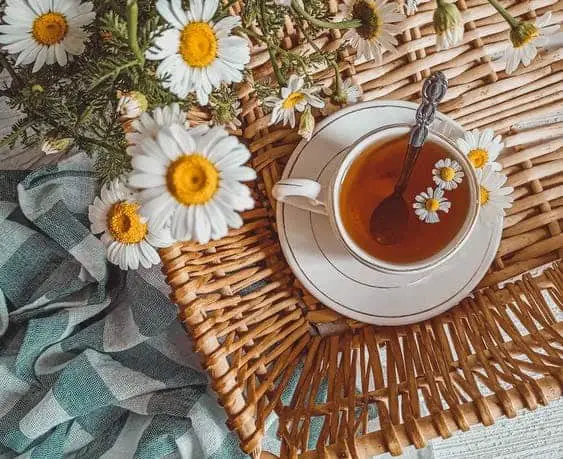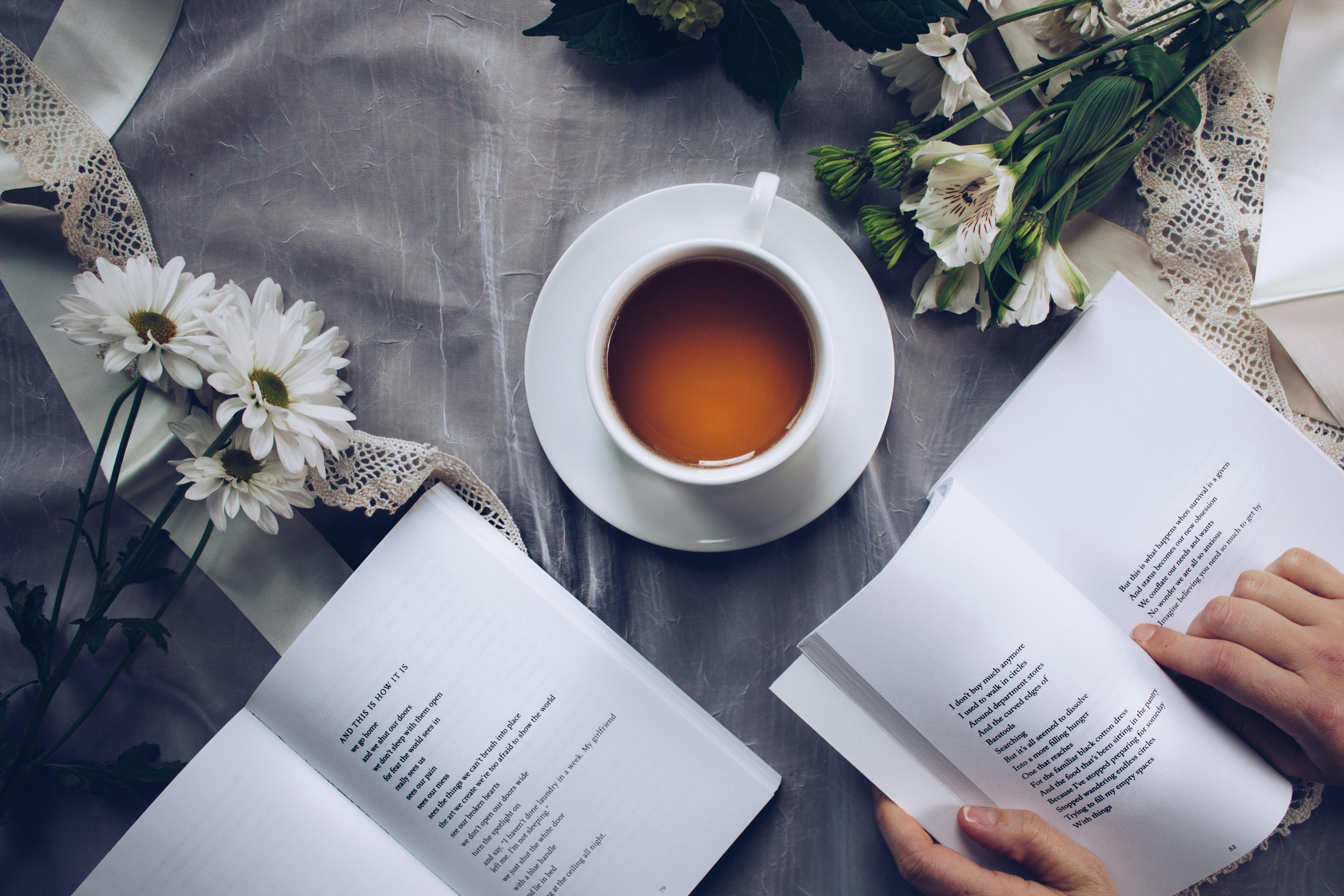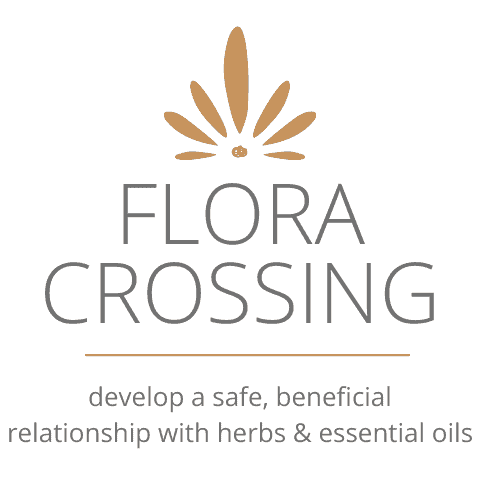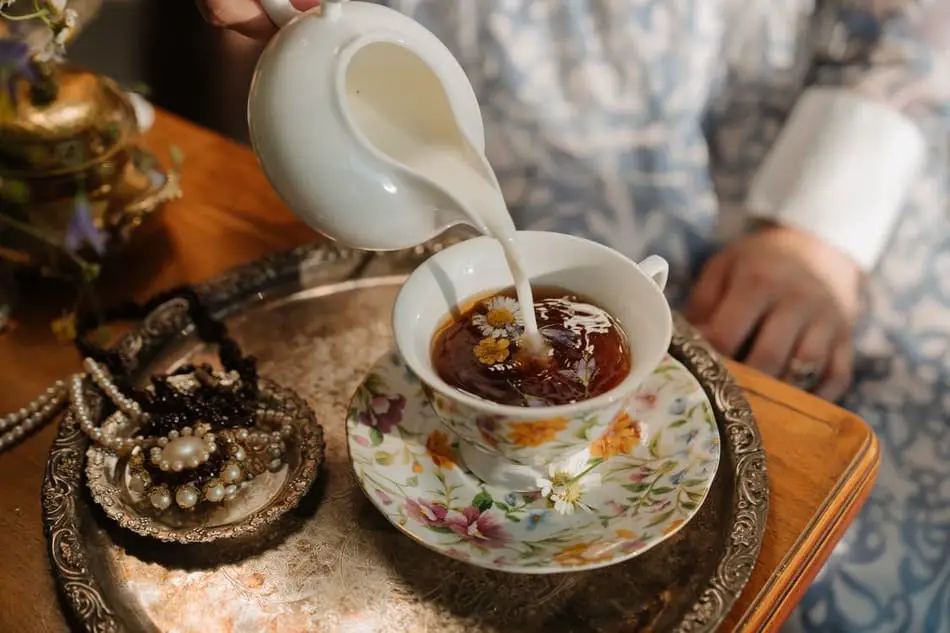A cup of chamomile tea may help bring families together while also reducing stress. Chamomile tea served in a beautiful garden with family, sugar, milk, or honey is one of life’s simple pleasures. A gorgeous costume or inviting friends over for high tea are both choices.
What does chamomile tea taste like? Chamomile tea may taste earthy or apple-like, depending on your experience with herbal teas. Various elements influence how good or terrible your cup of tea tastes, including how you brewed it. It’s an easy process.
Chamomile tea is a must-have for herbal tea lovers, but some people don’t enjoy the taste or smell of this flower brew and are looking for a better chamomile tea. For some reason, chamomile tea has an unpleasant flavor.
Chamomile tea is made with dried chamomile flowers and honey. You can use lemon, peppermint, or any other flavor in place of the honey. When you steep chamomile flowers in a cup of tea for a long time, they give the beverage a strong flavor. This herbal tea needs 5-6 minutes of brewing to be properly prepared.
A cup of chamomile tea might help anxiety and stress sufferers the components in the tea aid in relieving tension and sleeplessness. Once you’ve mastered the art of producing excellent, flowery chamomile tea, we’re sure you won’t be able to put your cup down for long.

A sun-loving flower, the Chamomile has a golden-yellow head and white petals that follow the sun throughout the day. We discover our Chamomile on the Eastern Croatian plains, where the flowers get far too much sun exposure. It is a thriving plant covering wide expanses of farmland with golden blooms.
Health Benefits Of Chamomile Tea
If you ignore chamomile tea’s bitter debate, it can benefit your health. It’s a blessing in disguise since it leads to a tea with health advantages that may assist you to live a healthier life.
Chamomile tea may be used to soothe your nerves and reduce any discomfort. This chamomile tea recipe can help with depression, anxiety, nausea, and stomach ulcers, among other things. Apigenin, an antioxidant in chamomile flowers, binds to receptors in the brain that promote light relaxation and restful sleep by binding with specific receptors.
Chamomile tea’s natural anti-inflammatory properties and distinctive sweetness make it an ideal therapy for stomach ulcers and other associated health problems.
Chamomile tea, which has a soothing effect on the nerves, can also aid in the treatment of panic attacks.
People who drink chamomile flower tea regularly claim that it has skincare benefits. Instead of employing harsh chemical exfoliants, try chamomile tea infusion as a natural radiance boost on your skin.
What does Chamomile lemon tea taste like?
According to a poet, this tea is hot and warm like his lover’s burning eyes and kind smile.
To enhance the flavor, add a lemon’s zest to a cup of brewed chamomile tea. You may also sweeten the taste by sprinkling in some raw honey.
Chamomile tea may be flavored in various ways to match your tastes. So, how about a slice of lemon in your tea to start your day, right?
Is It Normal For Chamomile Tea To Taste Like Herbs?
In the past, soy milk and ginger were popular additions to chamomile tea. Imagine the scents of some of the world’s best herbs as you sip your chamomile tea.
Teatime was a must in the old days. The blue-rimmed cups were filled with herbed chamomile tea, stylish and aristocratic.
Chamomile tea produced from dried chamomile blooms and daisies is mild and soothing. Despite its pale yellow color, it has a strong and delicious flavor. It’s crucial to use only a few tea bags of herbal Chamomile to avoid an overpowering, bitter taste. Raw honey or sugar might be added to the flavor of a cup of chamomile tea with plants.
Milk and Chamomile Tea
Some people think that chamomile tea tastes better with soy milk and a hint of ginger in it.
Tea with milk and chamomile flowers, on the other hand, is bland and mild. You can experiment by adding a splash of milk to chamomile tea.
Chamomile Tea Brewing
Add a slice of fruit such as an apple, raw honey, mint, lavender, ginger, soy milk, lemon, or even a little sugar to make your hot cup of chamomile tea a bit sweeter. Chamomile tea has a refreshing floral scent and an earthy flavor.
Chamomile tea is prepared by soaking dried chamomile flowers in boiling water for an extended period. It’s possible to end up with a harsh flavor in the tea if you overdo it with the brewing time. Brew the tea for no more than five to six minutes.
Why Does Chamomile Tea Have Such A Bad Taste?
The reputation of chamomile tea is poor among tea enthusiasts. Those concerned about their health should know that it is herbal, unlike other teas.
Chamomile tea, for example, is not unpleasant to drink if you’ve ever had any. Unlike other herbal teas, unsweetened chamomile tea has a floral, earthy flavor.
What Can You Do To Improve The Taste Of Chamomile Tea?
Have you ever gone too far in the rain, alone or with others? Take a seat, take off your heavy coat and boots, and enjoy a soothing cup of chamomile tea. You will see the magic!
It is also possible to add raw honey to improve the taste. Health-conscious tea drinkers also take tea with ginger. It doesn’t matter what you put in it as long as it appeals to your sense of taste.
Conclusion

Chamomile tea is a simple herbal beverage that doesn’t require any additional flavoring or sweeteners to enjoy. Chamomile tea has several health advantages and is an excellent method to relax tense muscles.
The scent of herbal beverages is supposed to soothe the spirits of those who consume them. Herbal chamomile tea bags are said to have supernatural powers, sending stress into outer space and replacing it with peaceful sleep.
Related Articles:

